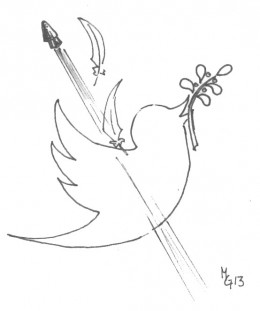
At 10 a.m. Monday morning, news was only breaking.
Twitter was abuzz with varying rumors and reports. One shooter. Two Shooters. One shooter down, one at large. Five victims; eight victims.
At press time, 13 people were reported killed, including the suspect.
Still, before even U.S. news outlets could confirm what was going on or how many had been killed at the Navy’s largest on-shore establishment, a Russian official took to Twitter. Alexey Pushkov, the head of the Russian Parliament’s foreign affairs committee, tweeted: “Nobody’s even surprised anymore. A clear confirmation of ‘American exceptionalism.’”
It’s hard not to be taken aback by Pushkov’s words. His brash comment lacked any accompanying expression of sympathy. He issued no condemnation of the attack or message of support for the victims. Rather, in a moment of intense national confusion and anxiety, Pushkov chose to make a dig at the U.S.
His comment, of course, plays off a part of Russian President Vladimir Putin’s op-ed in The New York Times, which has received much attention. President Barack Obama floated the idea of American exceptionalism as a relevant piece of U.S. foreign policy toward Syria. Putin, in response, wrote, ”It is extremely dangerous to encourage people to see themselves as exceptional, whatever the motivation.”
Less than 10 minutes after his first tweet, Pushkov posted again: “The USA should part with the notion of American exceptionalism.” Needless to say, Pushkov’s jab at the U.S. risks jeopardizing already strained U.S.-Russia relations.
Pushkov’s remarks are insensitive and crass. Diplomatically, behavior like his can only be detrimental. And his tweets represent the lowest form of realpolitik.
But what if, on a raw and deeply disturbing level, we are made so uncomfortable by what Pushkov has posted because, in a way, he’s right?
How many of us felt yesterday: “Oh, another shooting”?
Like that, we enter the cycle: mass shooting, widespread media coverage, return to normalcy, repeat.
What does that say?
Do Pushkov’s tweets get at something dark and terrifyingly true about our society that we might not acknowledge on our own? Something we haven’t quite fully grappled with, even after Fort Hood and Sandy Hook? Even after Aurora? And Columbine?
Have these attacks become typical of the American experience?
The definition of what it means to be an American should not include mourning the loss of our own at the hands of fellow countrymen, yet it seems as though regular tragedies such as these are more and more a facet of the American identity.
We suspect that too many of us processed yesterday’s attack with a certain acceptance of the inevitability of an occasional shooting. How deep-seated is our complacency for violence in this country? Our proclivity to murder is numbing.
Maybe that is what makes us exceptional.


